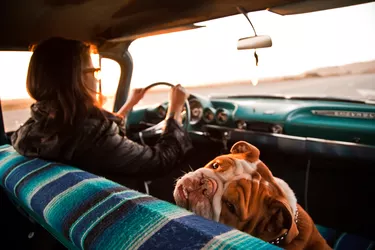
Tip
Restricted licenses work by allowing drivers to operate vehicles during certain times and for specific purposes.
Drivers who have committed multiple infractions, or who have been convicted of driving under the influence of alcohol or drugs, may have their driver's licenses suspended for a specific period of time. For some, this can lead to a job loss or make them unable to fulfill critical obligations. In such cases, states may offer a restricted license.
Restricted licenses allow the holder to drive for specific purposes. These might include driving to and from work or school, to seek medical treatment or to go to a grocery store. Judges generally have some latitude in setting these restrictions, and privileges vary on a case-by-case basis.
Video of the Day
Video of the Day
Exploring Restricted License Eligibility
State laws vary on who can be issued restricted licenses and how soon a person can get one after a suspension. South Carolina allows the driver to apply for a restricted license prior to her administrative hearing. In Virginia, the court can grant a restricted license after someone has been convicted of his first DUI or certain drug offenses, but that individual will have to wait at least three years for one after a third DUI conviction.
Nevada allows restricted licenses halfway through the period of a DUI suspension. New Hampshire, meanwhile, offers no restricted license at all – a suspended or revoked license means the offender can't drive under any circumstances.
Proving Your Need
Restricted licenses aren't automatically granted. You'll need to apply to the relevant agencies in your state and present an effective case that demonstrates your need. The process may involve petitioning the court to grant you a waiver that allows the license, and then filling out the paperwork with the state department of motor vehicles. Some states require a formal hearing, where you'll be asked to verify your employment or otherwise confirm you have a legitimate need to drive.
If you need to drive for medical treatment, for example, you'll need a doctor's note. In addition, you could have to prove you have no reasonable alternative besides driving. If you can take a bus to and from work, the state is less likely to issue a restricted license.
Drivers in Training
Many states offer a form of restricted license to young people that allows them to practice driving. These learner's permits are only valid if there's a licensed adult in the car with the teen driver.
Others provide restricted licenses to teens who have passed their licensing exams. These have different designs than an ordinary license and bar teens from driving late at night. Those who would ordinarily be too young to drive may get restricted licenses that allow them to go to work or school if they can demonstrate the need.
If you're caught violating the terms of your learner's permit, you'll be sanctioned based on your state law. For example, in New York, if you're convicted of speeding, reckless driving or any two other violations, your license will be suspended for 60 days and will be restricted for an additional six months after that.
When You Violate the Restriction
Driving in violation of the restricted license privileges leads to penalties that depend on the state law and the offense. In Arizona, if you've been convicted of drunk driving and required to install an interlock device, you'll have that requirement extended another year if you're convicted of driving a different vehicle. In Iowa, misuse of your license can lead to fines or jail sentences.